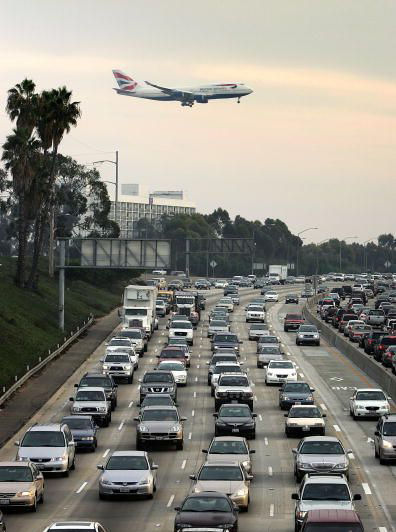
Roads to and from LAX on Thanksgiving Eve, 2005
A recent report written by the LADOT seemed to spell an early end for efforts to create a congestionpricing plan for LAX. The report, spelled out eight major obstacles to such a plan including public opposition, the difficulty collecting tolls without creating more congestion along the non-highway roads, and that the peak airport congestion hour, 11:00 a.m. to noon, doesn't correlate to highway congestion on the 405. The report also states that congestion pricing shouldn't occur until more transit options, notably the extension of the Green Line to LAX, are completed; causing curbed.la to re-title the report, Congestion Pricing for LAX When Hell Freezes Over.
However, the report received a different reception from the City Council Transportation Committee. Councilmember Bill Rosendahl, who represents the district containing LAX and sponsored the motion that called for the report, asked about "next steps" for the plan and asked LADOT to coordinate efforts with Metro and LAX's Master Plan Committeeto continue to examine different options for HOT Lanes (High Occupancy Toll Lanes) providing access to the airport. The councilmember doesn't believe that HOT Lanes could be going in any time soon, but wants to be ready if the opportunity presents itself.
"In two or three years, we might be ready to move on congestion pricing. If that moment comes I want to be ready," Rosendahl said.
Rosendahl also noted that no congestion pricing scheme for the airport should move forward until there are more transit options, but he was talking about buses. The motion to ask LADOT to report back on the study's progress in three months passed unanimously, although Councilmember Tom LaBonge restated his philosophical opposition to HOT Lanes.
The LADOT also updated the committee on Metro's application for funds to turn existing HOV Lanes on LA County Highways to HOT Lanes. The FHWA's decision, originally expected this month, has been delayed possibly until April. The LADOT estimates that of the $643 million that Metro asked for, $35 million could be used to bolster city run transit options such as the DASH service.
Photo: Viewimages





